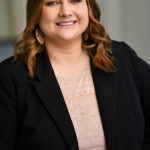
Stephanie is a recent graduate of the University of Washington MPH program through the Center of Excellence in Maternal and Child Health. She became interested in public health during her time working as a Family and Health Advocate for the Easterseals Head Start and Early Head Start program in Chicago. She found that many families in low-income communities lacked access to the resources needed to support family well-being or the proper tools to help their children have healthy early years. Stephanie’s research interests include early childhood development, low-income community needs, nutrition, and prenatal health. Stephanie completed her MPH practicum with the Health Coalition for Children and Youth (HCCY), and her thesis work was a mixed-methods evaluation of SNAP-Ed activity participation among Washington’s SNAP recipient population. Stephanie will soon be moving to Portland, Oregon to take on the role of Program Manager for the Oregon Pediatric Improvement Partnership (OPIP) through the Department of Pediatrics at OHSU.
“During Spring quarter of the 2018-2019 academic year, I had the opportunity to attend and participate in the 2019 Making Lifelong Connections Conference at the University of Wisconsin, Madison. This conference created limitless opportunities to network and collaborate with colleagues within the field of Maternal and Child Health. In conversations with trainees and staff from other academic institutions, conference attendees were able to discuss their respective programs in the context of what is going well, what can be improved, and how different programs may collaborate in the future. Participants spent time networking and participating in creative exercises in addition to enjoying local Wisconsin cheese curds, marveling at the architecture of the capitol building, and commiserating over stressful academic requirements due to the quickly approaching close of the academic quarter.
One of the main focuses of the conference was to share MCH-related research through round table pitch sessions, poster pitch sessions, and large format research presentations. I presented my preliminary thesis findings in one of the pitch roundtable sessions. At this point in my research, I was struggling with paring down an enormous data table set into meaningful, understandable results. I expected to walk away with guidance from other professionals on how to analyze my data or other transcript organization techniques. Instead, I walked away with a lesson in communication. My research took the angle of nutrition in social services while my co-participants were more well-versed in the specifics of dietetics and nutrition education. Quickly seeing that I may not be able to gain specific research insights to analyze my raw data, I took the opportunity to practice simply communicating the core elements of my research.
As I listened to other participants research presentations and continued to reflect on my pitch session, I gathered together a few pieces of knowledge that I will use moving forward:
- Know your audience. Whenever possible, plan ahead and gather information about your audience in order to avoid surprises.
- Don’t be afraid to change course. If you feel your presentation is not being received as expected, don’t be afraid to change it up! You may surprise yourself with your agility and walk away with new talking points for future presentations.
- Ask for more. If you are intrigued by a fellow guest speaker, approach them later to compliment them and ask more questions if given the opportunity. You’ll likely brighten their day and learn more about them as a person in addition to learning about their work.
I love attending conferences and networking events, and MCH Lifelong Connections Conference is one that I would highly recommend for other MCH trainees. I felt more connected than ever to the national MCH community and walked away feeling inspired to continue with my research. I was in need of a professional push at that moment, and the conference reminded me of the value in communicating progress in the field of Maternal and Child Health.”
-Stephanie Stover

